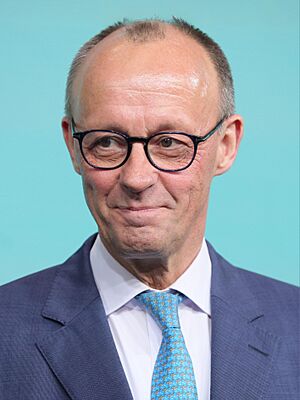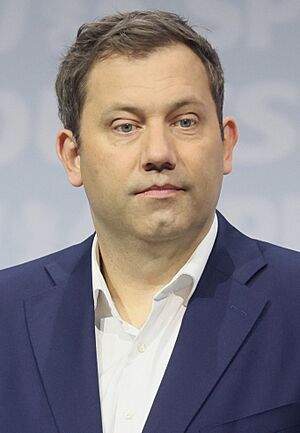Chancellor of Germany facts for kids
Quick facts for kids Federal Chancellor of the Federal Republic of Germany |
|
|---|---|
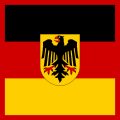
Standard of the German Chancellor
|
|
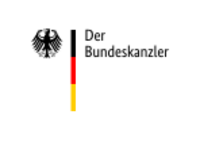
Logo of the German Chancellor
|
|
| Executive branch of the Federal Government Federal Chancellery |
|
| Style | Mr. Chancellor (informal) His Excellency (diplomatic) |
| Member of | Federal Cabinet European Council |
| Seat | Federal Chancellery, Berlin (main seat) Palais Schaumburg, Bonn (secondary seat) |
| Nominator | President |
| Appointer | President upon election by the Bundestag |
| Term length | until the constitution of a new Bundestag (renewable) |
| Constituting instrument | German Basic Law (German Constitution) |
| Formation | 1 July 1867 |
| First holder | Otto von Bismarck |
| Deputy | Vice Chancellor |
| Salary | €255,150 per year (as of 2020[update]) |
The Chancellor of Germany is the leader of Germany's government. Their official title is the Federal Chancellor of the Federal Republic of Germany. This person is like the chief executive of the country. They lead the Federal Cabinet, which is a group of top government officials.
The Chancellor is chosen by the Bundestag, which is Germany's parliament. The federal president suggests a candidate, and then the Bundestag votes. If Germany is in a state of defense, the Chancellor also becomes the commander-in-chief of the Bundeswehr, which is Germany's armed forces.
Since Germany became the Federal Republic, ten people have served as Chancellor. The first was Konrad Adenauer, who served from 1949 to 1963. The current Chancellor is Friedrich Merz from the Christian Democratic Union party. He took office on May 6, 2025.
Contents
How the Chancellor's Role Developed
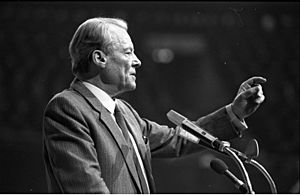
The role of Chancellor in Germany has a very long history. It goes all the way back to the Holy Roman Empire, which existed from around 900 to 1806. Back then, a "chancellor" was the head of the church officials in the Emperor's chapel. This group helped the Emperor with official documents.
Later, in the 1700s, the office of an Austrian state chancellor became important. This person handled the internal and foreign affairs for the Habsburg monarchy. After the Holy Roman Empire ended in 1806, other German states also had chancellors.
The modern role of Chancellor began in 1867 with the North German Confederation. This was a group of German states led by Prussia. The first Bundeskanzler (federal Chancellor) was Otto von Bismarck, who was also the Minister-President of Prussia.
In 1871, the North German Confederation became the German Empire. The title changed to Reichskanzler (imperial Chancellor). This title continued during the Weimar Republic, which was Germany's first democratic government after World War I.
During Nazi Germany, the role of Reichskanzler was combined with the role of President. Adolf Hitler held both titles, becoming Führer und Reichskanzler (Leader and Chancellor of the Reich).
After World War II, in 1949, the new German constitution, called the Basic Law, brought back the title of Bundeskanzler. This time, the Chancellor was given more power than before. Germany is now often called a "chancellor democracy" because the Chancellor has such a strong leadership role.
In East Germany, which existed from 1949 to 1990, there was no Chancellor. The head of government was called the Minister President or the chairman of the Council of Ministers.
The Chancellor's Role Today

Germany's 1949 constitution, the Basic Law, gives the Chancellor a lot of power to guide government policy. This is why Germany is sometimes called a "chancellor democracy." Even though the Chancellor is very powerful, it's actually the third-highest office in Germany. The president of Germany is first, and the president of the Bundestag (like the speaker of parliament) is second.
The main political parties in Germany, the CDU/CSU and the SPD, usually call their top candidate for federal elections the "chancellor-candidate" (Kanzlerkandidat). The German government, called the Bundesregierung, includes the Chancellor and their cabinet ministers.
How the Chancellor Leads
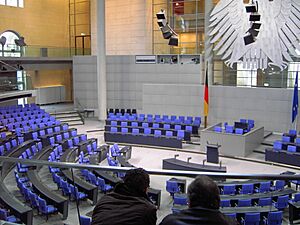
The Chancellor's power comes from the Basic Law and from being the leader of the party (or group of parties) that has the most seats in the Bundestag. Most Chancellors have also been the leader of their own political party.
The first Chancellor, Konrad Adenauer, set many important examples. He made the Chancellorship the clear center of power in Germany. He made almost all major decisions himself. While later Chancellors have been less controlling, the Chancellor's role has become very strong.
The Chancellor chooses who will be in the Federal Cabinet. The President officially appoints and removes these ministers, but only after the Chancellor recommends them. The Chancellor decides how many ministers there will be and what their jobs are.
The Basic Law has three main rules for how the government works:
- The "chancellor principle" means the Chancellor is responsible for all government policies. This is called Richtlinienkompetenz, which means "guideline setting power." Any official policy guidelines from the Chancellor must be followed by the cabinet ministers.
- The "principle of ministerial autonomy" means each minister can manage their own department and suggest laws. They can do this as long as their policies fit with the Chancellor's overall guidelines.
- The "cabinet principle" means that if federal ministers disagree about their responsibilities or money matters, the whole cabinet must settle the issue.
Chancellors of Germany (1949–Present)
| Portrait | Name (Birth–Death) |
Term of office | Political party |
Vice Chancellor(s) | Cabinets | ||||
|---|---|---|---|---|---|---|---|---|---|
| Term | Time in office | ||||||||
| 1 |  |
Konrad Adenauer (1876–1967) |
15 September 1949 – 16 October 1963 |
14 years, 31 days | CDU | Franz Blücher (1949–57) Ludwig Erhard (1957–63) |
I
II III IV |
||
| 2 |  |
Ludwig Erhard (1897–1977) |
16 October 1963 – 1 December 1966 |
3 years, 46 days | CDU | Erich Mende (1963–66) Hans-Chr. Seebohm (1966) |
I
II |
||
| 3 |  |
Kurt Georg Kiesinger (1904–1988) |
1 December 1966 – 22 October 1969 |
2 years, 325 days | CDU | Willy Brandt (1966–69) | I | ||
| 4 |  |
Willy Brandt (1913–1992) |
22 October 1969 – 7 May 1974 |
4 years, 197 days | SPD | Walter Scheel (1969–74) | I
II |
||
| Vice Chancellor Walter Scheel served as acting Chancellor from 7 May to 16 May 1974. | |||||||||
| 5 |  |
Helmut Schmidt (1918–2015) |
16 May 1974 – 1 October 1982 |
8 years, 138 days | SPD | Hans-D. Genscher (1974–82) Egon Franke (1982) |
I
II III |
||
| 6 |  |
Helmut Kohl (1930–2017) |
1 October 1982 – 27 October 1998 |
16 years, 26 days | CDU | Hans-D. Genscher (1982–92) Jürgen Möllemann (1992–93) Klaus Kinkel (1993–98) |
I
II III IV V |
||
| 7 |  |
Gerhard Schröder (b. 1944) |
27 October 1998 – 22 November 2005 |
7 years, 26 days | SPD | Joschka Fischer (1998–2005) | I
II |
||
| 8 |  |
Angela Merkel (b. 1954) |
22 November 2005 – 8 December 2021 |
16 years, 16 days | CDU | Franz Müntefering (2005–07) Frank-W. Steinmeier (2007–09) Guido Westerwelle (2009–11) Philipp Rösler (2011–13) Sigmar Gabriel (2013–18) Olaf Scholz (2018–21) |
I
II III IV |
||
| 9 |  |
Olaf Scholz (b. 1958) |
8 December 2021 – 6 May 2025 |
3 years, 149 days | SPD | Robert Habeck (2021–25) | I | ||
| 10 |  |
Friedrich Merz (b. 1955) |
6 May 2025 – Incumbent |
285 days | CDU | Lars Klingbeil (Incumbent) | I | ||
How the Chancellor is Elected
The Chancellor is elected by the Bundestag and then officially appointed by the President of Germany. This can happen in two ways: a regular election or a "constructive vote of no confidence."
A regular Chancellor election happens when the position becomes empty. This occurs when a new Bundestag meets for the first time, or if the previous Chancellor resigns or passes away during their term.
The election needs a "chancellor majority." This means a majority of all elected members of the Bundestag, not just those who are present and voting. The election is done by secret ballot. The process has three possible stages:
First Voting Stage
The President of Germany suggests a candidate to the Bundestag. The Bundestag then votes on this person without any debate. Usually, the President waits for political parties to agree on a candidate after an election.
If the suggested candidate gets the "chancellor majority," the President appoints them. Then, the President of the Bundestag gives them the oath of office.
Second Voting Stage
If the first candidate is not elected, the Bundestag can then suggest its own candidates. A candidate needs support from at least one-quarter of all members of parliament (MPs). The Bundestag can hold many votes over two weeks. A candidate still needs the "chancellor majority" to be elected.
Third Voting Stage
If no one is elected after two weeks, a final vote happens the very next day. Again, candidates need support from at least one-quarter of all MPs. If a candidate gets the "chancellor majority" in this vote, they are elected. If not, the President of Germany has a choice: either appoint the candidate who got the most votes, or dissolve the Bundestag and call for new elections.
So far, no Chancellor election has ever reached this third stage.
What is a Vote of No Confidence?
The Bundestag can also replace a Chancellor through a "constructive vote of no confidence." This means the Bundestag can vote out the current Chancellor only if they simultaneously elect a new Chancellor with the "chancellor majority." This has happened twice:
| Date | Proposed Candidate (Party) | Incumbent Chancellor (Party) | Yes-votes | No-votes | Abstentions | Absent / void | Necessary majority | Result |
|---|---|---|---|---|---|---|---|---|
| 27 April 1972 | Rainer Barzel (CDU) | Willy Brandt (SPD) | 247 | 10 | 3 | 236 | 249 | Motion failed |
| 1 October 1982 | Helmut Kohl (CDU) | Helmut Schmidt (SPD) | 256 | 235 | 4 | 2 | 249 | Motion successful |
There's also a "motion of confidence." Only the Chancellor can propose this to the Bundestag. If the Chancellor loses this vote, it doesn't mean they leave office right away. Instead, it gives them options. They can ask the President to dissolve the Bundestag and call for new elections. Or, they can declare a "legislative emergency," which allows the government to pass laws for a short time without the Bundestag's full approval. This motion is a way for the Chancellor to keep their party or coalition in line. If MPs don't support the Chancellor, they risk new elections.
The Vice Chancellor
The Chancellor must choose one of their cabinet ministers to be the Vice Chancellor. The Vice Chancellor can fill in for the Chancellor if they are away or cannot do their job. In governments formed by a coalition of parties, the leader of the second-largest party usually becomes the Vice Chancellor.
If a Chancellor's term ends or they resign, the Bundestag must elect a new Chancellor. The President of Germany might ask the old Chancellor to stay on temporarily. But if the old Chancellor doesn't want to or can't, the President can appoint the Vice Chancellor as acting Chancellor. This happened once in 1974 when Chancellor Willy Brandt resigned. Vice Chancellor Walter Scheel became acting Chancellor for nine days until a new Chancellor was elected.
The current Vice Chancellor of Germany is Lars Klingbeil. He also serves as the Minister of Finance in the Merz cabinet.
List of Vice Chancellors (1949–Present)
| Portrait | Name (Birth–Death) |
Term of office | Political party | Cabinet | Portfolio | ||||
|---|---|---|---|---|---|---|---|---|---|
| Term | Time in office | ||||||||
| 1 |  |
Franz Blücher (1896–1959) |
20 September 1949 – 29 October 1957 |
8 years, 30 days | FDP | Adenauer I Adenauer II |
Marshall Plan/Economic Cooperation | ||
| 2 |  |
Ludwig Erhard (1897–1977) |
29 October 1957 – 16 October 1963 |
5 years, 362 days | CDU | Adenauer III Adenauer IV |
Economic Affairs | ||
| 3 |  |
Erich Mende (1916–1998) |
17 October 1963 – 28 October 1966 |
3 years, 10 days | FDP | Erhard I Erhard II |
Intra-German Relations | ||
| The office was vacant from 28 October to 8 November 1966. | |||||||||
| 4 |  |
Hans-Christoph Seebohm (1903–1967) |
8 November 1966 – 1 December 1966 |
23 days | CDU | Erhard II | Transport | ||
| 5 |  |
Willy Brandt (1913–1992) |
1 December 1966 – 22 October 1969 |
2 years, 325 days | SPD | Kiesinger | Foreign Affairs | ||
| 6 |  |
Walter Scheel (1919–2016) |
22 October 1969 – 16 May 1974 |
4 years, 207 days | FDP | Brandt I Brandt II |
Foreign Affairs | ||
| 7 |  |
Hans-Dietrich Genscher (1927–2016) 1st term |
17 May 1974 – 17 September 1982 |
8 years, 123 days | FDP | Schmidt I Schmidt II Schmidt III |
Foreign Affairs | ||
| 8 |  |
Egon Franke (1913–1995) |
17 September 1982 – 1 October 1982 |
14 days | SPD | Schmidt III | Intra-German Relations | ||
| The office was vacant from 1 October to 4 October 1982. | |||||||||
| 9 |  |
Hans-Dietrich Genscher (1927–2016) 2nd term |
4 October 1982 – 18 May 1992 |
9 years, 230 days | FDP | Kohl I Kohl II Kohl III Kohl IV |
Foreign Affairs | ||
| 10 |  |
Jürgen Möllemann (1945–2003) |
18 May 1992 – 21 January 1993 |
249 days | FDP | Kohl IV | Economic Affairs | ||
| 11 |  |
Klaus Kinkel (1936–2019) |
21 January 1993 – 27 October 1998 |
5 years, 279 days | FDP | Kohl IV Kohl V |
Foreign Affairs | ||
| 12 |  |
Joschka Fischer (b. 1948) |
27 October 1998 – 22 November 2005 |
7 years, 26 days | Alliance 90/The Greens | Schröder I Schröder II |
Foreign Affairs | ||
| 13 |  |
Franz Müntefering (b. 1940) |
22 November 2005 – 21 November 2007 |
1 year, 364 days | SPD | Merkel I | Labour and Social Affairs | ||
| 14 |  |
Frank-Walter Steinmeier (b. 1956) |
21 November 2007 – 27 October 2009 |
1 year, 340 days | SPD | Merkel I | Foreign Affairs | ||
| 15 |  |
Guido Westerwelle (1961–2016) |
27 October 2009 – 16 May 2011 |
1 year, 201 days | FDP | Merkel II | Foreign Affairs | ||
| 16 |  |
Philipp Rösler (b. 1973) |
16 May 2011 – 17 December 2013 |
2 years, 215 days | FDP | Merkel II | Economic Affairs | ||
| 17 |  |
Sigmar Gabriel (b. 1959) |
17 December 2013 – 14 March 2018 |
4 years, 87 days | SPD | Merkel III | Economic Affairs (2013–2017) Foreign Affairs (2017–2018) |
||
| 18 |  |
Olaf Scholz (b. 1958) |
14 March 2018 – 8 December 2021 |
3 years, 269 days | SPD | Merkel IV | Finance | ||
| 19 |  |
Robert Habeck (b. 1969) |
8 December 2021 – 6 May 2025 |
3 years, 149 days | Alliance 90/The Greens | Scholz | Economic Affairs and Climate Protection | ||
| 20 |  |
Lars Klingbeil (b. 1978) |
6 May 2025 – Incumbent |
285 days | SPD | Merz | Finance | ||
Where the Chancellor Works and Lives
Since 2001, the main office for the Chancellor is the Federal Chancellery in Berlin. There is also a secondary office, the Palais Schaumburg in Bonn, which used to be the main seat when Bonn was the capital. The Chancellor also has a country retreat called Schloss Meseberg in the state of Brandenburg.
Many Chancellors have chosen to live in their own private homes. For example, Angela Merkel lived in her private apartment in downtown Berlin.
Images for kids
How to Address the Chancellor
In German, you would say Herr Bundeskanzler for a male Chancellor or Frau Bundeskanzlerin for a female Chancellor. In international settings, the Chancellor is often called "His/Her Excellency the Chancellor of the Federal Republic of Germany."
Chancellor's Salary
The Chancellor of Germany holds a very important position. They receive a salary of €220,000 per year, plus a €22,000 bonus.
See also
 In Spanish: Canciller de Alemania para niños
In Spanish: Canciller de Alemania para niños
- Vice-Chancellor of Germany
- Leadership of East Germany
- List of chancellors of Germany by time in office
- Religious affiliations of chancellors of Germany
 | Anna J. Cooper |
 | Mary McLeod Bethune |
 | Lillie Mae Bradford |


